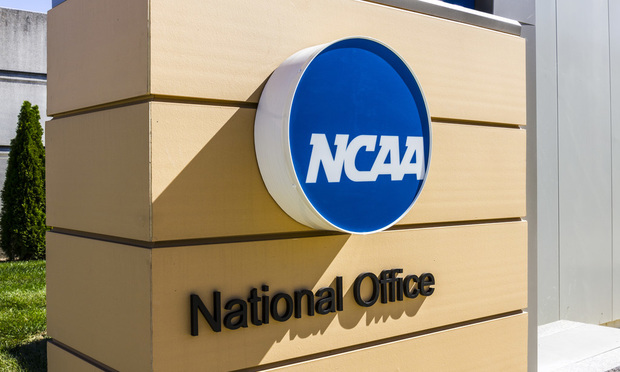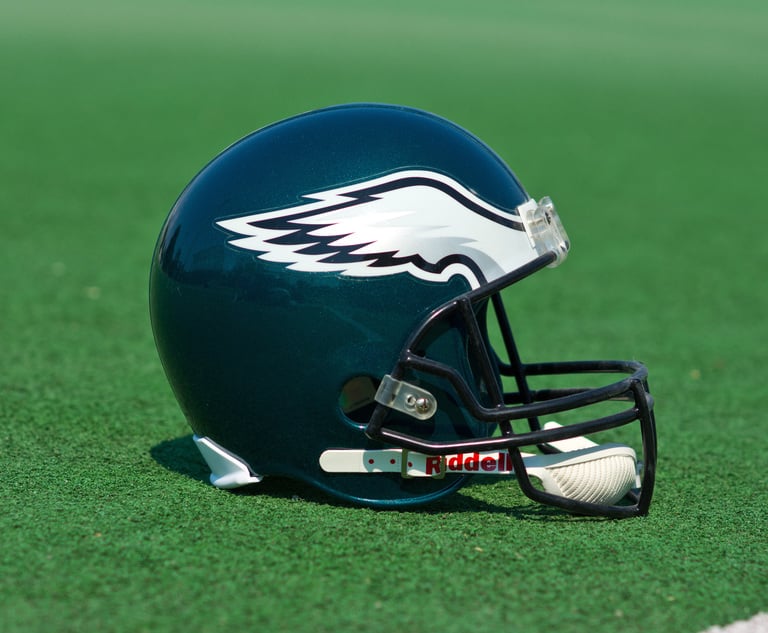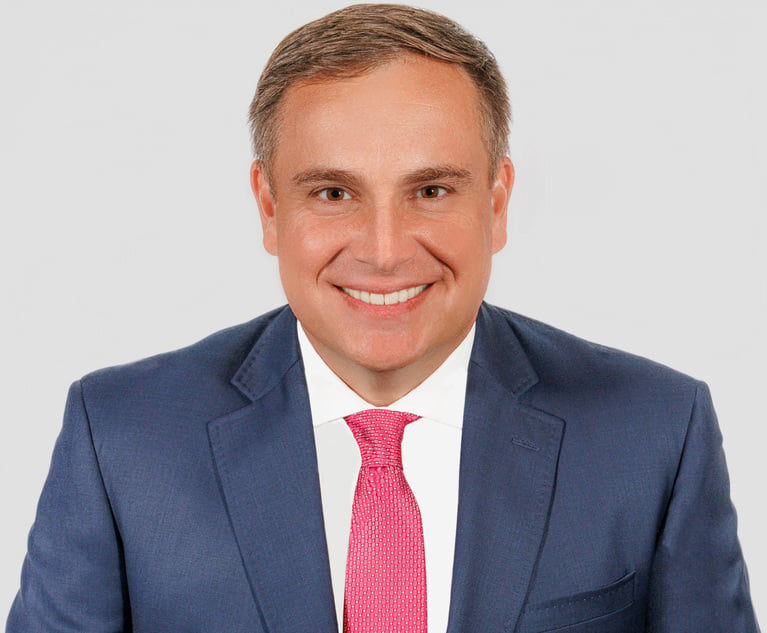NCAA Seeks to Block Ex-Villanova Wide Receiver's Claim for Wages
The National Collegiate Athletic Association and Villanova University have asked a federal court to dismiss a former college football player's lawsuit alleging that he is owed wages for his time as a scholarship athlete for the school.
October 09, 2018 at 01:21 PM
4 minute read
 National Collegiate Athletic Association headquarters in Indianapolis, Indiana. Photo: Shutterstock
National Collegiate Athletic Association headquarters in Indianapolis, Indiana. Photo: Shutterstock
The National Collegiate Athletic Association and Villanova University have asked a federal court to dismiss a former college football player's lawsuit alleging that he is owed wages for his time as a scholarship athlete for the school.
The NCAA and Villanova on Monday filed a summary judgment motion in Livers v. National Collegiate Athletic Association. The lawsuit, which raises claims under the Fair Labor Standards Act, had been granted a green light in July after U.S. District Judge Michael Baylson of the Eastern District of Pennsylvania determined that plaintiff Lawrence “Poppy” Livers made a plausible argument that scholarship athletes, like work study students, qualify as students under the FLSA.
The latest effort to dismiss the case focuses on the argument that Livers failed to bring the suit within the two-year statute of limitations. Although the statute of limitations can be expanded to three years if a defendant is shown to have acted willfully, attorneys for the NCAA and Villanova contended that, because there is no case law indicating that scholarship students constitute employees under the FLSA, they cannot be found to have willfully violated the law.
“Because there is no authority stating that student-athletes are ipso facto employees of the school for whom they play—indeed the existing authorities draw the opposite conclusion—there exists no law that defendants could have disregarded, either intentionally, or merely recklessly,” Los Angeles-based Constangy Brooks, Smith & Prophete attorney Steven Katz said in the motion he filed for the NCAA and Villanova. “Even if the court were inclined to make new law on this issue, it is impossible for defendants to have willfully violated a new rule before it was ever announced.”
In May, Baylson dismissed much of the first iteration of Livers' suit, which included claims against multiple schools. Baylson had determined that Livers could only bring claims against schools he attended. Baylson further held that, since Livers' last season with Villanova football ended Dec. 13, 2014, and his complaint was filed Sept. 26, 2017, he failed to sue within the statute of limitations.
Still, Baylson said Livers should be afforded “the opportunity to amend his complaint to allege additional facts, if he can, addressing willfulness in order to attempt to overcome the time bar to his claim.”
In July, after Livers renewed his claims against the NCAA and Villanoa, Baylson said the former player had made a plausible argument that scholarship athletes fell within the employee status. The judge further said the defendants had been “aware of this when they chose not to pay them, suggesting reckless disregard of the alleged duty.”
In their motion filed Monday, the defendants contended that 60 years of case law from state courts hold that student athletes are not students, and, in the years since Livers brought his suit, several federal courts, including the U.S. Court of Appeals for the Seventh Circuit, have also found that student athletes are not “ipso facto” employees.
“Even if plaintiff were able to persuade this court that the law should change—and that is an extraordinarily big 'if'—it could not change the conclusion that defendants acted in accord with 'a reasonable interpretation of existing law' in the past, and were accordingly not willful,” the motion said.
Paul L. McDonald of PL McDonald Law in Philadelphia represents Livers and did not respond to a request for comment. Press offices for NCAA and Villanova both did not return a request for comment Tuesday morning.
This content has been archived. It is available through our partners, LexisNexis® and Bloomberg Law.
To view this content, please continue to their sites.
Not a Lexis Subscriber?
Subscribe Now
Not a Bloomberg Law Subscriber?
Subscribe Now
NOT FOR REPRINT
© 2025 ALM Global, LLC, All Rights Reserved. Request academic re-use from www.copyright.com. All other uses, submit a request to [email protected]. For more information visit Asset & Logo Licensing.
You Might Like
View All
Pa. Superior Court Rules Pizza Chain Liable for Franchisee Driver's Crash
4 minute read
Pa. Defense Firm Sued by Client Over Ex-Eagles Player's $43.5M Med Mal Win
3 minute read

Trending Stories
- 1Attorneys 'On the Move': Herrick Bolsters Tech Practice with IP Partner; Cozen O’Connor Adds Member to Its Fund Formation Group
- 2NJ Jury Awards $4.5M After Woman Trips on Carpet
- 3Blake Lively Is Sued by Texas Crisis Specialist in Latest 'It Ends With Us' Lawsuit
- 4Pa. High Court to Decide Whether Flight in a High Crime Area Can Result in an Investigative Stop
- 5EB-5 Immigration Investor Program: a Win-Win Program, or Is It?
Who Got The Work
J. Brugh Lower of Gibbons has entered an appearance for industrial equipment supplier Devco Corporation in a pending trademark infringement lawsuit. The suit, accusing the defendant of selling knock-off Graco products, was filed Dec. 18 in New Jersey District Court by Rivkin Radler on behalf of Graco Inc. and Graco Minnesota. The case, assigned to U.S. District Judge Zahid N. Quraishi, is 3:24-cv-11294, Graco Inc. et al v. Devco Corporation.
Who Got The Work
Rebecca Maller-Stein and Kent A. Yalowitz of Arnold & Porter Kaye Scholer have entered their appearances for Hanaco Venture Capital and its executives, Lior Prosor and David Frankel, in a pending securities lawsuit. The action, filed on Dec. 24 in New York Southern District Court by Zell, Aron & Co. on behalf of Goldeneye Advisors, accuses the defendants of negligently and fraudulently managing the plaintiff's $1 million investment. The case, assigned to U.S. District Judge Vernon S. Broderick, is 1:24-cv-09918, Goldeneye Advisors, LLC v. Hanaco Venture Capital, Ltd. et al.
Who Got The Work
Attorneys from A&O Shearman has stepped in as defense counsel for Toronto-Dominion Bank and other defendants in a pending securities class action. The suit, filed Dec. 11 in New York Southern District Court by Bleichmar Fonti & Auld, accuses the defendants of concealing the bank's 'pervasive' deficiencies in regards to its compliance with the Bank Secrecy Act and the quality of its anti-money laundering controls. The case, assigned to U.S. District Judge Arun Subramanian, is 1:24-cv-09445, Gonzalez v. The Toronto-Dominion Bank et al.
Who Got The Work
Crown Castle International, a Pennsylvania company providing shared communications infrastructure, has turned to Luke D. Wolf of Gordon Rees Scully Mansukhani to fend off a pending breach-of-contract lawsuit. The court action, filed Nov. 25 in Michigan Eastern District Court by Hooper Hathaway PC on behalf of The Town Residences LLC, accuses Crown Castle of failing to transfer approximately $30,000 in utility payments from T-Mobile in breach of a roof-top lease and assignment agreement. The case, assigned to U.S. District Judge Susan K. Declercq, is 2:24-cv-13131, The Town Residences LLC v. T-Mobile US, Inc. et al.
Who Got The Work
Wilfred P. Coronato and Daniel M. Schwartz of McCarter & English have stepped in as defense counsel to Electrolux Home Products Inc. in a pending product liability lawsuit. The court action, filed Nov. 26 in New York Eastern District Court by Poulos Lopiccolo PC and Nagel Rice LLP on behalf of David Stern, alleges that the defendant's refrigerators’ drawers and shelving repeatedly break and fall apart within months after purchase. The case, assigned to U.S. District Judge Joan M. Azrack, is 2:24-cv-08204, Stern v. Electrolux Home Products, Inc.
Featured Firms
Law Offices of Gary Martin Hays & Associates, P.C.
(470) 294-1674
Law Offices of Mark E. Salomone
(857) 444-6468
Smith & Hassler
(713) 739-1250





